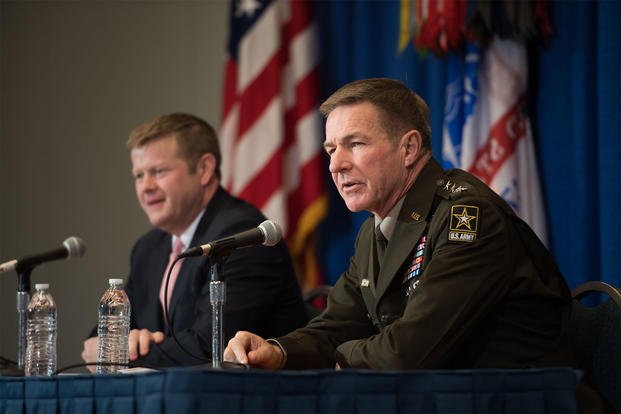Soldiers could get an opportunity to remain longer at duty stations of their choice under a policy pushed by new Army Chief of Staff Gen. James McConville.
The traditional "industrial-age" system that can require moves every three years is out of place in an information-age Army, McConville said.
"I don't see why people can't stay four, five, six, seven, eight, nine years," McConville said to a packed audience of military families Tuesday at the Association of the U.S. Army's annual exposition and convention.
"You all helped us by bringing to the attention of the chain of command where there are issues," McConville told the families, and the burden and hassle of frequent permanent changes of station, or PCS, was one of them.
McConville said he also wanted to limit PCS moves that can occur outside the peak summer moving season.
"People will say, hey, during the summer -- that's when the peak season is -- so some people say we'll move soldiers off-peak. I don't sign up for that," McConville said.
McConville noted that he and his wife, Marie, had made 22 moves during their Army career, and the moves were made more difficult when school was in session.
"I sign up for making less moves [and] stabilizing people longer, but we're not going to have the soldier moving in March and the kids getting pulled out of school," he said.
At a later session with a small group of reporters, McConville expanded on his initiative to allow longer tour options.
Related: Soldiers Will Once Again Get Pre-Move Cash, Army Chief Says
"I've told our Human Resources Command to start extending people or stabilizing people if they can do that," he said, adding that this was taking place according to the soldiers' preferences.
He cautioned that there will be limits on preferences, depending on the Army's needs.
"We defend a democracy; we're not a complete democracy," he said. "Let's see what the soldiers want to do with their families. If we can accommodate that within the mission, we will do that."
In the current system of three-year tours, "it's almost like an industrial-age process. You do this job, you go to that job, you go to that job, you gotta move, move, move," he said. However, "As long as you're meeting the mission and meeting your preference for growth, then I think we're okay."
New Sergeant Major of the Army Michael Grinston, who joined McConville at the informal session with reporters, said the more flexible moves policy would have to be carefully calibrated.
"Yes, the [McConville] controls that," Grinston said, but a policy change would have to take into account the soldiers who prefer the old system of frequent moves. There is a percentage in the ranks who will always say "I want to move," Grinston said.
-- Richard Sisk can be reached at Richard.Sisk@Military.com.
Read More: Excessive PT Will Cost the Army Millions of Lost Work Days















